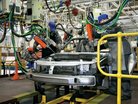SMMT: ZEV Mandate Will Cripple Automotive Manufacturing

The UK automotive industry is facing a crisis.
The pressure to shift to EVs, driven by global and local environmental policies, is not compatible with current consumer demand and economic realities.
The viability of enforced regulatory frameworks such as the Zero Emission Vehicle (ZEV) mandate has been brought into question in this light.
Industry leaders are urgently calling for government intervention to ensure a balanced and realistic approach to the EV transition.
The crisis of EV demand
The Society of Motor Manufacturers and Traders (SMMT) anticipates that meeting the ZEV mandate could force automotive manufacturing to shell out as much as US$7.5bn in the first year alone.
This staggering amount, coupled with subdued consumer interest in EVs, puts the sector’s future profitability and its ability to sustain operations in the long term into question.
There are very real fears that these factors may severely impact the industry's financial health.
The stringent mandates anticipated for 2024 seem increasingly unrealistic as projections show a shortfall of 94,000 electric cars compared to initial estimates.
This expected deficit underscores the sector’s struggle with meeting the ambitious target of a 22% EV market share, which may subject manufacturers to hefty compliance penalties.
Manufacturers have been responding strongly to EV policy pressures.
The past year has seen a 30% increase in the number of available EV models, with the market now featuring more than 125 car models and more than 30 van models enhanced by the latest advancements in battery technology.
These improvements aimed at addressing common concerns such as range anxiety, highlight the industry's commitment to increasing the reliability and appeal of EVs.
Additionally, manufacturers have pumped approximately US$5bn into market incentives to boost sales.
Yet despite these efforts, the anticipated surge in consumer uptake has not materialised.
The industry’s growth is further hindered by rising interest rates, escalating raw material costs and geopolitical tensions, all of which contribute to economic uncertainty that makes the shift to EVs less appealing for consumers.
The persisting scepticism around the adequacy of charging infrastructure also plays a significant role in reducing adoption.
"We need an urgent review of the automotive market and the regulation intended to drive it," says Mike Hawes, CEO at SMMT.
"Not because we want to water down any commitments, but because delivery matters more than notional targets."
ZEV Mandates: Global approaches
Globally the approach to ZEV mandates varies significantly, reflecting diverse economic contexts and policy priorities.
The United States, notably California, has been a pioneer, setting a precedent with its first ZEV mandate back in 1990.
Similarly, Canada sees provinces like Québec and British Columbia pushing forward with ambitious ZEV adoption targets.
China, as the largest automotive market worldwide, has also embraced a stringent New Energy Vehicle (NEV) mandate that significantly influences global EV trends.
The policy focusses on both electric and hybrid vehicles, reinforcing China’s role as a vital player in the sector's shift towards sustainability.
Meanwhile, the UK is enforcing legal mandates requiring a substantial increase in EV sales by 2030, aiming for all new cars and vans to be zero-emission by 2035. The European Union, though lagging in mandatory targets, encourages EV production through voluntary targets that align with its climate goals.
The SMMT is advocating for a re-evaluation of the ZEV mandate to better align with practical market conditions and to provide viable incentives for manufacturers.
This includes proposals to stimulate consumer demand, enhance the charging infrastructure and foster a competitive business landscape essential for ensuring the sector’s growth trajectory over the coming decade.
"The industry is hurting; profitability and viability are in jeopardy and jobs are on the line," continues Mike.
"When the world changes, so must we. Backed with incentives, workable regulation will set us up for success and green growth over the next decade."
The path forward requires coordinated efforts between the government and the automotive industry to bridge the gap between ambitious environmental targets and current market dynamics.
By adopting a flexible and supportive approach, the UK can secure the future of its automotive sector and affirm its commitment to achieving broader environmental objectives.
Guillaume Cartier, Chairperson for Nissan's AMIEO region, has also called for an overhaul of the ZEV mandate.
"The mandate risks undermining the business case for manufacturing cars in the UK and the viability of thousands of jobs and billions of pounds in investment," he says, urging policymakers to listen to those in the sector and make reasonable adjustments.
Explore the latest edition of Manufacturing Digital and be part of the conversation at our global conference series, Manufacturing LIVE.
Discover all our upcoming events and secure your tickets today.
Manufacturing Digital is a BizClik brand.
- Manufacturing & Mobility LIVE: The Future of EVs & MobilitySustainability & ESG
- Saab: Automotive Repurposing for Sustainable SuccessSustainability & ESG
- Stellantis & CATL Boost EV Manufacturing CapacitySustainability & ESG
- Formula E: Shaping the Innovative Future of EV ManufacturingSustainability & ESG


